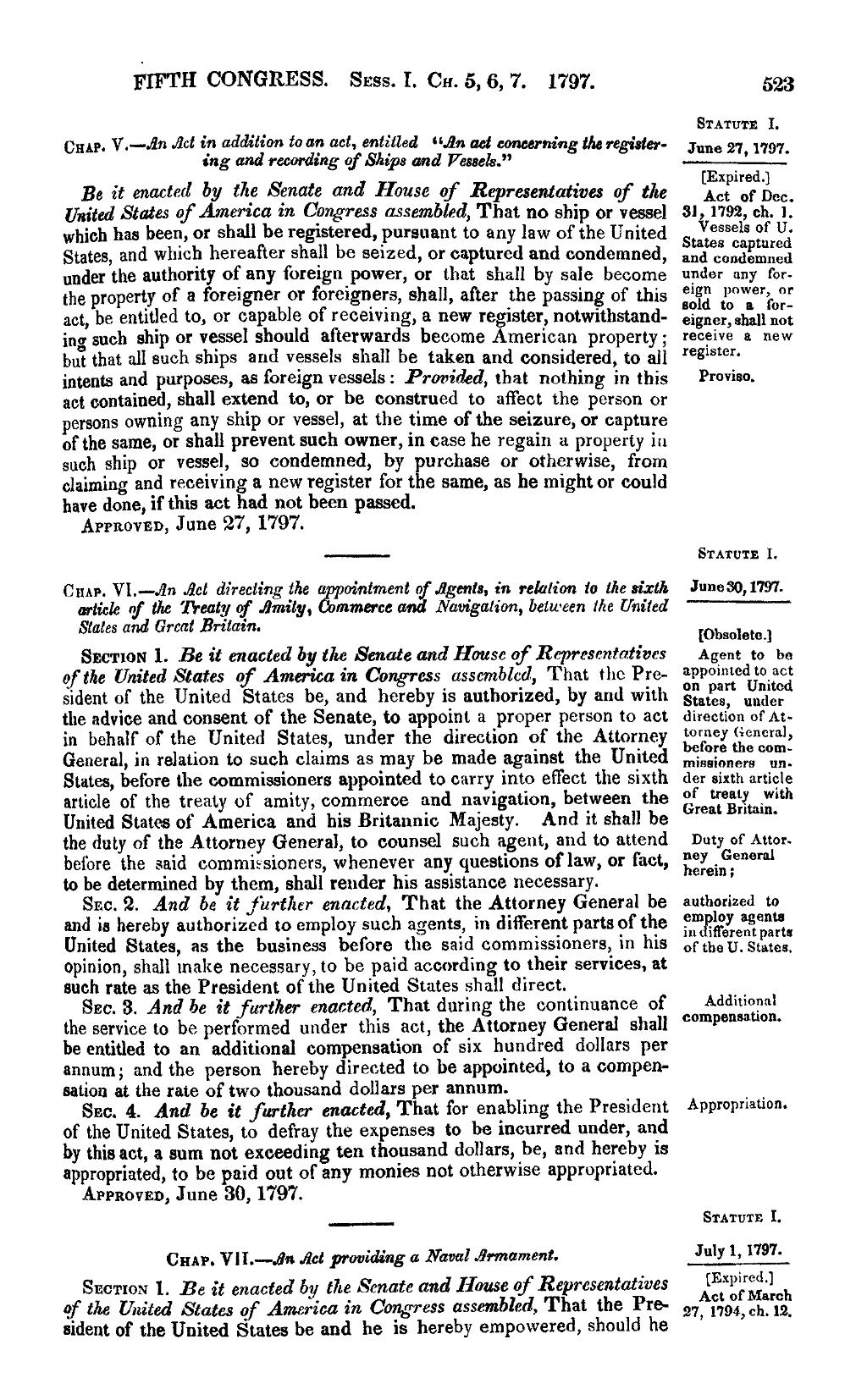[Expired.]
Chap. Ⅴ.—An Act in addition to an act, entitled “An act concerning the registering and recording of Ships and Vessels.”
Act of Dec. 31, 1792, ch. 1.
Vessels of U. States captured and condemned under any foreign power, or sold to a foreigner, shall not receive a new register.
Proviso.Be it enacted by the Senate and House of Representatives of the United States of America in Congress assembled, That no ship or vessel which has been, or shall be registered, pursuant to any law of the United States, and which hereafter shall be seized, or captured and condemned under the authority of any foreign power, or that shall by sale become the property of a foreigner or foreigners, shall, after the passing of this act, be entitled to, or capable of receiving, a new register, notwithstanding such ship or vessel should afterwards become American property; but that all such ships and vessels shall be taken and considered, to all intents and purposes, as foreign vessels: Provided, that nothing in this act contained, shall extend to, or be construed to affect the person or persons owning any ship or vessel, at the time of the seizure, or capture of the same, or shall prevent such owner, in case he regain a property in such ship or vessel, so condemned, by purchase or otherwise, from claiming and receiving a new register for the same, as he might or could have done, if this act had not been passed.
Approved, June 27, 1797.
Statute Ⅰ.
[Obsolete.]
Chap. Ⅵ.—An Act directing the appointment of Agents, in relation to the sixth article of the Treaty of Amity, Commerce and Navigation, between the United States and Great Britain.
Agent to be appointed to act on part United States, under direction of Attorney General, before the commissioners under sixth article of treaty with Great Britain.
Duty of Attorney General herein;Section 1. Be it enacted by the Senate and House of Representatives of the United States of America in Congress assembled, That the President of the United States be, and hereby is authorized, by and with the advice and consent of the Senate, to appoint a proper person to act in behalf of the United States, under the direction of the Attorney General, in relation to such claims as may be made against the United States, before the commissioners appointed to carry into effect the sixth article of the treaty of amity, commerce and navigation, between the United States of America and his Britannic Majesty. And it shall be the duty of the Attorney General, to counsel such agent, and to attend before the said commissioners, whenever any questions of law, or fact, to be determined by them, shall render his assistance necessary.
authorized to employ agents in different parts of the U. States.Sec. 2. And be it further enacted, That the Attorney General be and is hereby authorized to employ such agents, in different parts of the United States, as the business before the said commissioners, in his opinion, shall make necessary, to be paid according to their services, at such rate as the President of the United States shall direct.
Additional compensation.Sec. 3. And be it further enacted, That during the continuance of the service to be performed under this act, the Attorney General shall be entitled to an additional compensation of six hundred dollars per annum; and the person hereby directed to be appointed, to a compensation at the rate of two thousand dollars per annum.
Appropriation.Sec. 4. And be it further enacted, That for enabling the President of the United States, to defray the expenses to be incurred under, and by this act, a sum not exceeding ten thousand dollars, be, and hereby is appropriated, to be paid out of any monies not otherwise appropriated.
Approved, June 30, 1797.
Statute Ⅰ.
[Expired.]
Chap. Ⅶ.—An Act providing a Naval Armament.
President may man and employ the frigates;Section 1. Be it enacted by the Senate and House of Representatives of the United States of America in Congress assembled, That the President of the United States be and he is hereby empowered, should he

